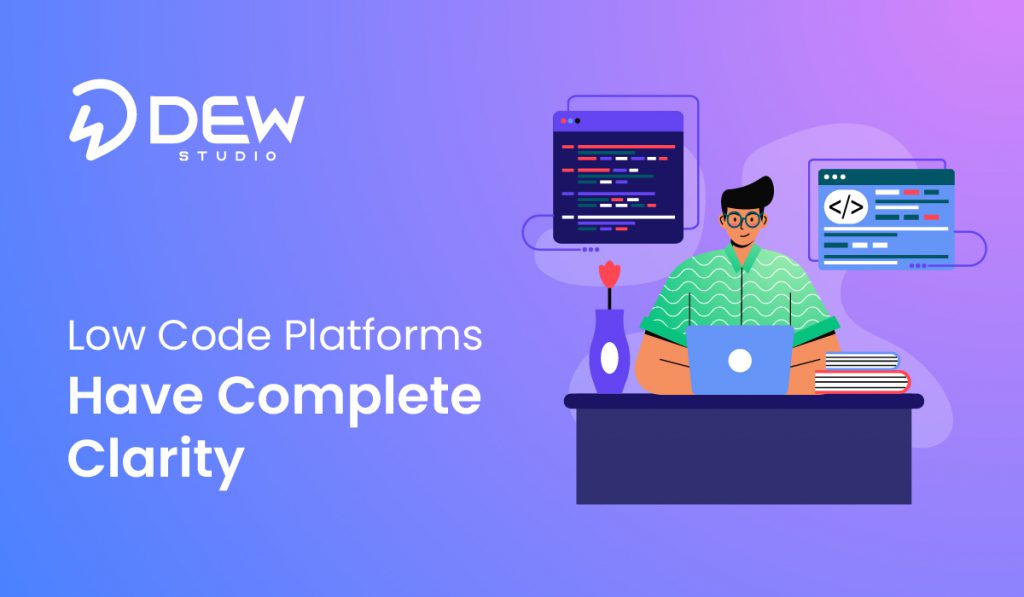Digital transformation refers to digitizing enterprise operations, business processes, and workflow. Businesses strive to integrate internal processes through apps as more and more of them move their operations online.
A corporation must digitize as many workloads, procedures, and operations as possible if it wants to shift to the digital age successfully. Simply said, the company will require new software or a single program with numerous project management features like Jira and Confluence provide.
Low-code application development platforms can aid in and promote digital transformation by minimizing the amount of manual or extensive coding required to construct enterprise applications. In this article, we will discuss the Low-Code solution for businesses and enterprises and its role in transforming an enterprise digitally.
What Are Low-Code Development Platforms?
Due to its built-in application development capacity, a Low-Code development platforms eliminates the manual coding needed to build software. Low-Code solutions enable quick app development by providing a code generation feature with drag-and-drop capabilities to facilitate app development. If one learns some fundamental programming skills, such as HTML, JavaScript, CSS, etc., they will be able to use the Low-Code tool to construct enterprise-level apps with ease. Having a basic understanding of coding allows users to implement coding at each stage of the development process quickly; thereby, users will have more influence over the many functions of Low-Code or No-Code software.
In addition, some Low-Code development platforms call for specific expertise in web-based tools like HTTPS, TLS, and encryption, as well as knowledge on how to set up the web server that serves as the host for the Low-Code application. However, some of the best Low-Code development tools, such as the DEW studio, generate applications more quickly and make it simple for developers to create a production-ready prototype. With its built-in coding functionality and features like data binding, flow programming, etc., The Low Code app’s primary goal is to reduce tedious coding tasks.
Low-Code and No-Code Development in the Digital Transformation
Low-Code helps developers to speed up the app development process and helps businesses assist in their digital transformation by:
Empowering Business Managers:
Business analysts might become more involved in digital transformation to make their jobs easier, thanks to Low-Code development platforms. In addition, they will be able to do company operations activities more effectively due to this.
These stakeholders’ duties are being digitalized, enabling them to spend more time in the planning and development process. Additionally, they can simply design tools for crucial company procedures using a Low-code automation platform, ensuring efficiency.
Speeding Up Software Development:
Projects can quickly meet the deadline or even sooner if a company can digitize its diversity of jobs through apps developed in a short amount of time with a Low-Code platform. While simultaneously working on multiple projects, a department might spend more time on its core business processes.
Many Low-Code platforms also provide a library of extensions, which can increase the application’s capability. For instance, an API library for Low-Code software might have additions for 2FA authentication factors, data integration, and PCI-compliant payment processing.
Smaller businesses that want specialized software but do not have the resources or a large team of engineers to produce it can benefit from Low-Code app or no-code development platforms. However, a Low-Code development solution is also quite helpful for larger organizations attempting to automate their business activities.
Simplifying Complex Tasks:
Developers can create an enterprise-level application utilizing the Low-Code platform. It also allows them to complete more complicated tasks that do require professional coding more quickly. Low-Code development makes it simple to add beneficial expansions into external applications through APIs, which is helpful for expert coders. Even novice developers can create a simple application using Low-Code software and complete tedious tasks in significantly less time using the interactive UI of the Low-Code automation platform. Low-Code app accomplishes this by shortening the time needed to create an app while accelerating the development of customized apps.
Coordinating Developers & Managers Efficiently
An effective DevOps practice is necessary for digital transformation. However, delivering an app into production on time might be challenging if there is a DevOps talent gap. Additionally, it should be noted that Low-Code development platforms are not a substitute for expert coding, but they might lessen the burden on overworked development teams. The Low-Code platform can also help non-developers and managers to have basic programming abilities, making them important resources for future development projects.
To sum up:
You should make sure a Low-Code platform is compatible with your current development ecosystem when searching for one. When using software testing tools to quality check your app and improve it for delivery, the Low-Code development should be regarded as any other source code. The most acceptable part of all is that by co-developing the apps with managers and developers, Low-Code solution also addresses the issue of shadow IT. To support a more seamless digital shift, It also makes sure that your app satisfies the same quality level.


